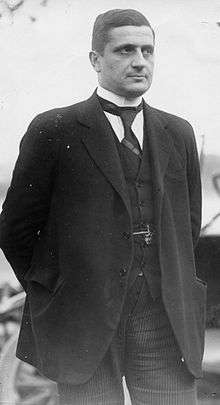Giovanni Amendola
Giovanni Amendola (15 April 1882 in Naples – 7 April 1926 in Cannes) was an Italian journalist and politician, noted as an opponent of Fascism.
Giovanni Amendola | |
|---|---|
 Amendola in 1923. | |
| Minister of the Colonies | |
| In office 26 February 1922 – 30 October 1922 | |
| Prime Minister | Luigi Facta |
| Preceded by | Giuseppe Girardini |
| Succeeded by | Luigi Federzoni |
| Member of the Italian Chamber | |
| In office 1 December 1919 – 7 April 1926 | |
| Constituency | Salerno |
| Personal details | |
| Born | 15 April 1882 Naples, Italy |
| Died | 7 April 1926 (aged 43) Cannes, France |
| Nationality | Italian |
| Political party | Italian Socialist Party (1897–1899) Radical Party (1900–1919) Democratic Liberal Party (1919–1926) |
| Spouse(s) | Eva Kuhn ( m. 1906–1926) |
| Children | Giorgio (1907–1980) Adelaide (1910–1980) Antonio (1916–1953) Pietro (1918–2007) |
| Alma mater | University of Florence |
| Profession | Journalist, philosopher |
Biography
Amendola was born in Naples. After he graduated with a degree in philosophy, he collaborated with such newspapers as Il Leonardo of Giovanni Papini and La Voce of Giuseppe Prezzolini. After that, he obtained the chair of theoretical philosophy at the University of Pisa.
Attracted by politics, he was elected three times to the Italian Chamber of Deputies for Salerno. In the 1910s, Amendola supported the Italian liberal movement, but he was completely against the ideology of Giovanni Giolitti. During World War I, he adopted a position of democratic irredentism and, at the end of the war, was nominated minister by Prime Minister Francesco Saverio Nitti.
His critical positions while confronting the right-wing extremism cost him a series of attacks by hired Fascist killers. In 1924 Amendola refused to adhere to the "Listone Mussolini", and attempted to become Prime Minister, at the head of a liberal coalition which ran in the elections. He was defeated, but continued the democratic battle by writing columns for the Il Mondo, a new daily newspaper which he founded together with other intellectuals.
Amendola is probably most famous for his publishing of the Rossi Testimony on 27 December 1924, during the height of the Matteotti Crisis, in one of his newspapers. The document directly implicated Prime Minister Mussolini in the murder of Giacomo Matteotti (leader of the Socialist PSU party) on the 10 June 1924, as well as declaring that he (Mussolini) was behind the reign of terror which led up to the 1924 general elections (held 6 April).
Resented by Benito Mussolini for his prominent activism, Amendola was, together with the Unitary Socialist Party deputy Giacomo Matteotti and the popular priest Don Giovanni Minzoni, one of the régime's earliest victims: he died in April, 1926 at Cannes in agony from violence inflicted by 15 Blackshirts with clubs in July, 1925.
His son, Giorgio Amendola, was an important communist writer and politician.
In the Florestano Vancini's film The Assassination of Matteotti (1973), Amendola is played by Damiano Damiani.
| Wikimedia Commons has media related to Giovanni Amendola. |
| Political offices | ||
|---|---|---|
| Preceded by Giuseppe Girardini |
Italian Minister of the Colonies 1922 |
Succeeded by Luigi Federzoni |